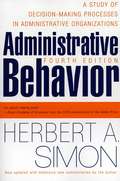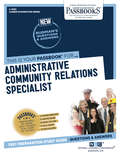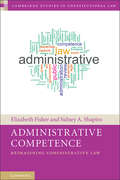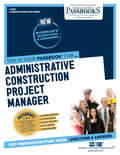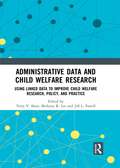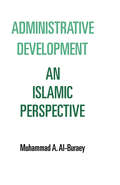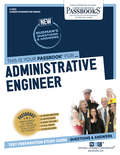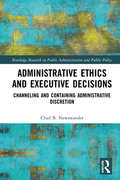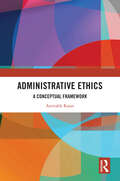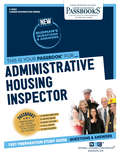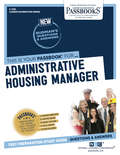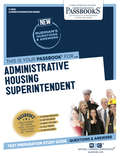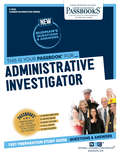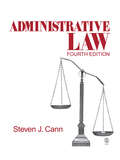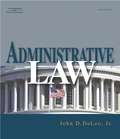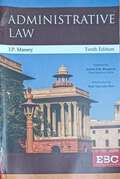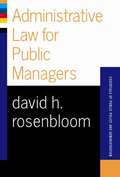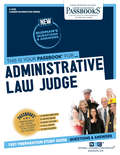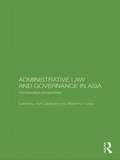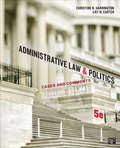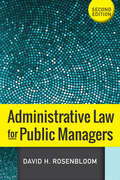- Table View
- List View
Administrative Behavior, 4th Edition
by Herbert A. SimonIn this fourth edition of his ground-breaking work, Herbert A. Simon applies his pioneering theory of human choice and administrative decision-making to concrete organizational problems. To commemorate the fiftieth anniversary of the book's original publication, Professor Simon enhances his timeless observations on the human decision-making process with commentaries examining new facets of organizational behavior. Investigating the impact of changing social values and modem technology on the operation of organizations, the new ideas featured in this revised edition update a book that has become a worldwide classic.Named by Public Administration Review as "Book of the Half Century," Administrative Behavior is considered one of the most influential books on social science thinking, and was referred to by the Nobel Committee as "epoch-making."Written for managers and other professionals who wish to understand the decision-making processes at the heart of organization and management, it is also essential reading for students in business and management, economics, sociology, psychology computer science, government, and law.
Administrative Behavior, 4th Edition
by Herbert A. SimonIn this fourth edition of his ground-breaking work, Herbert A. Simon applies his pioneering theory of human choice and administrative decision-making to concrete organizational problems. To commemorate the fiftieth anniversary of the book's original publication, Professor Simon enhances his timeless observations on the human decision-making process with commentaries examining new facets of organizational behavior. Investigating the impact of changing social values and modem technology on the operation of organizations, the new ideas featured in this revised edition update a book that has become a worldwide classic.Named by Public Administration Review as "Book of the Half Century," Administrative Behavior is considered one of the most influential books on social science thinking, and was referred to by the Nobel Committee as "epoch-making."Written for managers and other professionals who wish to understand the decision-making processes at the heart of organization and management, it is also essential reading for students in business and management, economics, sociology, psychology computer science, government, and law.
Administrative Burden: Policymaking by Other Means
by Pamela Herd Donald P. MoynihanBureaucracy, confusing paperwork, and complex regulations—or what public policy scholars Pamela Herd and Donald Moynihan call administrative burdens—often introduce delay and frustration into our experiences with government agencies. Administrative burdens diminish the effectiveness of public programs and can even block individuals from fundamental rights like voting. In AdministrativeBurden, Herd and Moynihan document that the administrative burdens citizens regularly encounter in their interactions with the state are not simply unintended byproducts of governance, but the result of deliberate policy choices. Because burdens affect people’s perceptions of government and often perpetuate long-standing inequalities, understanding why administrative burdens exist and how they can be reduced is essential for maintaining a healthy public sector. Through in-depth case studies of federal programs and controversial legislation, the authors show that administrative burdens are the nuts-and-bolts of policy design. Regarding controversial issues such as voter enfranchisement or abortion rights, lawmakers often use administrative burdens to limit access to rights or services they oppose. For instance, legislators have implemented administrative burdens such as complicated registration requirements and strict voter-identification laws to suppress turnout of African American voters. Similarly, the right to an abortion is legally protected, but many states require women seeking abortions to comply with burdens such as mandatory waiting periods, ultrasounds, and scripted counseling. As Herd and Moynihan demonstrate, administrative burdens often disproportionately affect the disadvantaged who lack the resources to deal with the financial and psychological costs of navigating these obstacles. However, policymakers have sometimes reduced administrative burdens or shifted them away from citizens and onto the government. One example is Social Security, which early administrators of the program implemented in the 1930s with the goal of minimizing burdens for beneficiaries. As a result, the take-up rate is about 100 percent because the Social Security Administration keeps track of peoples’ earnings for them, automatically calculates benefits and eligibility, and simply requires an easy online enrollment or visiting one of 1,200 field offices. Making more programs and public services operate this efficiently, the authors argue, requires adoption of a nonpartisan, evidence-based metric for determining when and how to institute administrative burdens, with a bias toward reducing them. By ensuring that the public’s interaction with government is no more onerous than it need be, policymakers and administrators can reduce inequality, boost civic engagement, and build an efficient state that works for all citizens.
Administrative Community Relations Specialist: Passbooks Study Guide (Career Examination Series)
by National Learning CorporationThe Administrative Community Relations Specialist Passbook® prepares you for your test by allowing you to take practice exams in the subjects you need to study. It provides hundreds of questions and answers in the areas that will likely be covered on your upcoming exam, including but not limited to: Problem solving and decision making; Management control; Interpersonal skills; Staff development; Written comprehension; and more.
Administrative Competence: Reimagining Administrative Law (Cambridge Studies in Constitutional Law)
by Elizabeth Fisher Sidney A. ShapiroThis book, by two of the world's leading administrative law scholars, reimagines administrative law as the law of public administration by making its competence the focus of administrative law. Grounded in extensive interdisciplinary, historical, and doctrinal analysis, Fisher and Shapiro show why understanding both the capacity and authority of expert public administration is crucial to ensure the legitimacy and accountability of the administrative state. To address the current precarious state of administrative law, they support a new study of the administrative process by an Attorney Generals Committee on Administrative Procedure leading to a revised Administrative Procedure Act (APA). This book is a must-read for anyone interested in administrative law and its reform.
Administrative Construction Project Manager: Passbooks Study Guide (Career Examination Series)
by National Learning CorporationThe Administrative Construction Project Manager Passbook® prepares you for your test by allowing you to take practice exams in the subjects you need to study. It provides hundreds of questions and answers in the areas that will likely be covered on your upcoming exam, including but not limited to: problem solving and decision making; supervisory and management control including delegation, planning, organizing, and prioritizing; development of subordinates; written comprehension; written communication; mathematical and statistical analysis; standards of proper employee conduct; and more.
Administrative Data and Child Welfare Research: Using Linked Data to Improve Child Welfare Research, Policy, and Practice
by Terry V. Shaw, Bethany R. Lee and Jill L. FarrellEvery day, social service agencies collect millions of pieces of data about the children and families they serve. Agencies depend on this data to inform decision-making by personnel throughout the organization and to provide meaningful research and evaluation on program effectiveness and outcomes. As capacity for collecting and utilizing data has increased so has the recognition that this data can and should be used more broadly. Further, it should include not just single-system data, but data across different human service agencies. Administrative/big data systems can be powerful tools in increasing the efficiency and effectiveness of public child welfare services. Understanding, harnessing, and using big data holds tremendous promise in creating transformative change in the social services. Data analytics and data mining can lead to a better understanding of what services work for specific populations (targeting and predictive modelling), provide a more nuanced understanding of service outcomes for the workforce and major stakeholders (transparency), and facilitate collaboration across existing service delivery silos to reduce duplication of services and enhance consumer access to services (efficiency). This book was originally published as a special issue of the Journal of Public Child Welfare.
Administrative Development: An Islamic Perspective
by Al-BuraeyFirst published in 1986. Routledge is an imprint of Taylor & Francis, an informa company.
Administrative Engineer: Passbooks Study Guide (Career Examination Series #C-1271)
by National Learning CorporationThe Administrative Engineer Passbook® prepares you for your test by allowing you to take practice exams in the subjects you need to study. It provides hundreds of questions and answers in the areas that will likely be covered on your upcoming exam, including but not limited to: employee management relations; evaluation of technical problems; operation of governmental agencies; management techniques; engineering subjects; and more.
Administrative Ethics and Executive Decisions: Channeling and Containing Administrative Discretion (Routledge Research in Public Administration and Public Policy)
by Chad B. NewswanderAs first responders to public problems, administrators must survey situations, identify solutions, and occasionally make executive decisions that are binding upon the government as a whole. The ability for administrators to assert claims that orient the government in a particular direction is not only powerful, but it can also be problematic and even dangerous. For administrators, the tension between moving in a spirited way, and remaining sensible, is a problem of how to exercise one’s discretion, especially in the U.S. context, which demands that both be considered and actualized. In dealing with these competing expectations, Chad B. Newswander analyzes how administrators can incorporate executive, legislative, and judicial tendencies to help them handle the problem of discretion. Expanding the thinking of the constitutional school of public administration thought, Administrative Ethics and Executive Decisions is a theoretically grounded and empirically rich study of how administrators incorporate a constitutional ethos to handle the problem of discretion.
Administrative Ethics: A Conceptual Framework
by Amitabh RajanThis insightful book explores the use and application of ethics in contemporary governance and suggests necessary reforms. Following an interdisciplinary approach involving the fields of political science, law, economics, sociology, management, and philosophy, this book analyses their applicability and usefulness in everyday practices in governance, covering its five cardinal virtues—prudence, transparency, discourse, justice, and accountability. Highlighting ethical challenges in aspects of status recognition, oppression, empowerment, social care, public financing, environment protection and others in today’s interconnected world, it delves into the dynamics of administrative power in democracies and showcases how the misuse of power can be controlled through a discourse of ethics in law and governance. The book will be useful to the students, researchers and teachers of public administration, philosophy, political Science, corporate ethics, and governance other related social sciences disciplines. The book will also be an indispensable companion to social activists, advocacy groups, journalists and civil society institutions and public service training institutions.
Administrative Housing Inspector: Passbooks Study Guide (Career Examination Series)
by National Learning CorporationThe Administrative Housing Inspector Passbook® prepares you for your test by allowing you to take practice exams in the subjects you need to study. It provides hundreds of questions and answers in the areas that will likely be covered on your upcoming exam, including but not limited to: management techniques; agency inspection procedures, rules and regulations and policy; assessment of condition of premises in order to determine the extent to which requirements are met; preparation of reports and correspondence; standards of proper employee ethical conduct; and more.
Administrative Housing Manager: Passbooks Study Guide (Career Examination Series)
by National Learning CorporationThe Administrative Housing Manager Passbook® prepares you for your test by allowing you to take practice exams in the subjects you need to study. It provides hundreds of questions and answers in the areas that will likely be covered on your upcoming exam, including but not limited to: communications and human relations; administration (including supervision and management functions, decision making and techniques of apportioning time) relevant to housing management; personnel management techniques and rules, and training methods and techniques; reading comprehension and interpretation of pertinent material; budget preparation and administration; government operations and relationships; and more.
Administrative Housing Superintendent: Passbooks Study Guide (Career Examination Series)
by National Learning CorporationThe Administrative Housing Superintendent Passbook® prepares you for your test by allowing you to take practice exams in the subjects you need to study. It provides hundreds of questions and answers in the areas that will likely be covered on your upcoming exam, including but not limited to: administration; supervision; personnel management techniques and rules; reading comprehension; preparing written material; understanding and interpreting written material; and other related areas.
Administrative Investigator: Passbooks Study Guide (Career Examination Series)
by National Learning CorporationThe Administrative Investigator Passbook® prepares you for your test by allowing you to take practice exams in the subjects you need to study. It provides hundreds of questions and answers in the areas that will likely be covered on your upcoming exam, including but not limited to: analysis and problem solving; management control; knowledge and application of rules, laws and procedures pertaining to investigations; preparing written material; understanding and interpreting written material; and other related areas.
Administrative Law
by Dr Steven J. CannIn this new edition, author Steven J. Cann once again enlivens the topic of United States administrative law through the use of recent and "classic" legal cases to make it accessible and interesting to students. Administrative Law, Fourth Edition is an engaging casebook that presents a unique problem-solving framework that contrasts democracy with the administrative state. This novel approach places the often complex subject matter of U.S. administrative law into a more comprehensible context. The Fourth Edition has been completely updated and revised and includes many new cases to reflect changes in the law since the year 2000.
Administrative Law
by John D. Deleo Jr.Administrative Law Agencies: What they Do, How they are Controlled, Unlocking the Mystery of Administrative Law is a text written for college students taking an introductory course in Administrative Law. The goal of the text is to take the mystery out of administrative law and is organized into three parts: creation of agencies, what agencies do, and how agencies are controlled. This organization brings clarity to the subject matter and allows students to focus on individual concepts while not losing sight of the big picture. The text uses a variety of practical examples to show how agencies are created, what they do, and how they are controlled. The emphasis of the text is on the function and control of agency processes, and is presented in a way that shows relevance to the student's every day life, leaving them with a working knowledge of how agencies operate.
Administrative Law (Routledge Revivals)
by Peter CaneThis title was first published in 2002. Designed to complement the first volume on administrative law which was published as part of the original series of "The International Library of Essays in Law and Legal Theory", the articles contained in this volume pick up on themes dealt with in the first, while others reflect different concerns and new developments in administrative law scholarship. It offers a representative sample of the best contemporary writing in administrative law - theoretical, empirical and doctrinal. What ties all the essays in this volume together is not that they fall within the province of administrative law, but that they are all concerned with the legal framework within which government business is conducted, and government policies are pursued, by executive action.
Administrative Law - Tenth Edition
by Prof. Dr I. P. MasseyThe document titled "Administrative Law" by Prof. (Dr.) I.P. Massey, with contributions from Abhinandan Malik and a foreword by former Chief Justice P.N. Bhagwati, provides a comprehensive examination of administrative law. It covers key concepts, objections, and the growing relevance of this legal field in controlling governmental power, especially in welfare states. Key topics include rule-making and adjudicatory powers of the administration, the tribunalization of justice, judicial review, public interest litigation, and the liability of administration. The book discusses the role of natural justice and principles to ensure the non-arbitrariness of administrative actions. It aims to bridge the gap between power and justice, making it essential for students, lawyers, and public administrators alike.
Administrative Law For Public Managers
by David H RosenbloomThis book focuses on the essentials that public managers should know about administrative law-why we have administrative law, the constitutional constraints on public administration, and administrative law's frameworks for rulemaking, adjudication, enforcement, transparency, and judicial and legislative review. Rosenbloom views administrative law from the perspectives of administrative practice, rather than lawyering with an emphasis on how various administrative law provisions promote their underlying goal of improving the fit between public administration and U.S. democratic-constitutionalism. Organized around federal administrative law, the book explains the essentials of administrative law clearly and accurately, in non-technical terms, and with sufficient depth to provide readers with a sophisticated, lasting understanding of the subject matter.
Administrative Law Judge: Passbooks Study Guide (Career Examination Series)
by National Learning CorporationThe Administrative Law Judge Passbook prepares you for your test by allowing you to take practice exams in the subjects you need to study. It provides hundreds of questions and answers in the areas that will likely be covered on your upcoming exam, including but not limited to: state and federal public assistance programs; administrative hearing proceedings; court decisions interpreting the powers of administrative boards and agencies; principles and theories of administrative law and the judicial review of administrative actions; legal terms and forms in common use in administrative proceedings; and more.
Administrative Law and Governance in Asia: Comparative Perspectives (Routledge Law in Asia)
by Tom Ginsburg Albert H. Y. ChenThis book examines administrative law in Asia, exploring the profound changes in the legal regimes of many Asian states that have taken place in recent years. Political democratization in some countries, economic change more broadly and the forces of globalization have put pressure on the developmental state model, wherein bureaucrats governed in a kind of managed capitalism and public-private partnerships were central. In their stead, a more market-oriented regulatory state model seems to be emerging in many jurisdictions, with emphases on transparency, publicity, and constrained discretion. This book analyses the causes and consequences of this shift from a socio-legal perspective, showing clearly how decisions about the scope of administrative law and judicial review have an important effect on the shape and style of government regulation. Taking a comparative approach, individual chapters trace the key developments in the legal regimes of major states across Asia, including China, Japan, Korea, Malaysia, Taiwan, Hong Kong, Indonesia, Singapore, the Philippines, Thailand and Vietnam. They demonstrate that, in many cases, Asian states have shifted away from traditional systems in which judges were limited in terms of their influence over social and economic policy, towards regulatory models of the state involving a greater role for judges and law-like processes. The book also considers whether judiciaries are capable of performing the tasks they are being given, and assesses the profound consequences the judicialization of governance is starting to have on state policy-making in Asia.
Administrative Law and Politics: Cases and Comments
by Lief H. Carter Christine B. HarringtonAuthors Christine B. Harrington and Leif H. Carter know that while bureaucratic government is no cure for the shortcomings of free enterprise, government oversight and regulation is crucial to keeping power within democratic boundaries. This Fifth Edition of Administrative Law and Politics shows the scope and power of administrative government and demonstrates how the legal system shapes administrative procedure and practice. Using accessible language and examples, the casebook provides the foundation that students, public administrators and policy analysts need to interpret the rules and regulations that support our legal system. Offering a balance of case excerpts and commentary, this new edition and has been thoroughly updated to account for recent developments, such as administrative law vis-à-vis freedom of information statutes, including the NSA’s surveillance program; how administrators and judges navigate the philosophical, political, and economic stakes behind divisions in the Roberts Court’s judicial theory of statutes; non-enforcement and government inaction, including the position of Administrative Law Judges (ALJ) and the federal government’s (Department of Education) Title IX policy on sexual assault, harassment, and other forms of sexual misconduct in education.
Administrative Law and Politics: Cases and Comments
by Lief H. Carter Christine B. HarringtonAuthors Christine B. Harrington and Leif H. Carter know that while bureaucratic government is no cure for the shortcomings of free enterprise, government oversight and regulation is crucial to keeping power within democratic boundaries. This Fifth Edition of Administrative Law and Politics shows the scope and power of administrative government and demonstrates how the legal system shapes administrative procedure and practice. Using accessible language and examples, the casebook provides the foundation that students, public administrators and policy analysts need to interpret the rules and regulations that support our legal system. Offering a balance of case excerpts and commentary, this new edition and has been thoroughly updated to account for recent developments, such as administrative law vis-à-vis freedom of information statutes, including the NSA’s surveillance program; how administrators and judges navigate the philosophical, political, and economic stakes behind divisions in the Roberts Court’s judicial theory of statutes; non-enforcement and government inaction, including the position of Administrative Law Judges (ALJ) and the federal government’s (Department of Education) Title IX policy on sexual assault, harassment, and other forms of sexual misconduct in education.
Administrative Law for Public Managers
by David H. RosenbloomAdministrative Law for Public Managers a comprehensive guide to the essentials that public managers need to know about administrative law#151;why we have administrative law, the constitutional constraints on public administration, and administrative law’s frameworks for rulemaking, adjudication, enforcement, transparency, and judicial and legislative review. Rosenbloom views administrative law from the perspectives of administrative practice, emphasizing how various administrative law provisions promote their underlying goal of improving the fit between public administration and U. S. democratic-constitutionalism. The second edition has been thoroughly revised to include more on state administrative law, as well as an expanded discussion of procedural due process. It has also been updated to include the major statutes, court cases, executive orders and other major executive initiatives since 2003. The addition of discussion questions makes this an even more valuable resource for public administration classrooms and students. Organized around federal administrative law, Administrative Law for Public Managers explains the fundamentals of administrative law clearly and accurately, in non-technical terms, and with sufficient depth to provide readers with a sophisticated, lasting understanding of the subject matter.
